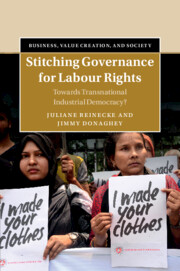Crossref Citations
This Book has been
cited by the following publications. This list is generated based on data provided by Crossref.
Carollo, Luca
Dorigatti, Lisa
Murgia, Annalisa
Parker, Simon
and
Steger, Thomas
2024.
Still in search of organizational democracy: exploring new opportunities and constraints.
STUDI ORGANIZZATIVI,
p.
7.
D’Cruz, Premilla
Delannon, Nolywé
Kourula, Arno
McCarthy, Lauren
Moon, Jeremy
and
Spence, Laura J
2024.
Contesting social responsibilities of business: Centring context, experience, and relationality.
Human Relations,
Vol. 77,
Issue. 7,
p.
889.
Delaney, Helen
Casey, Catherine
and
Fiedler, Antje
2024.
Mobilising tensions: transnational union network formation in the Asia-Pacific region.
Journal of Industrial Relations,
Zaman, Sawlat
and
Jenkins, Jean
2024.
Creating a local managerial regime in global context: The case of the Bangladesh ready‐made garment sector.
Industrial Relations Journal,
Vol. 55,
Issue. 6,
p.
425.
Soundararajan, Vivek
Wilhelm, Miriam
Crane, Andrew
Agarwal, Pankhuri
and
Shetty, Harish
2025.
Towards a Systemic Approach for Improving Working Conditions in Global Supply Chains: An Integrative Review and Research Agenda.
Academy of Management Annals,
Vol. 19,
Issue. 1,
p.
230.
Kustin, Bridget
Reinecke, Juliane
and
Donaghey, Jimmy
2025.
Transnational Capitalism After Postcolonialism: Researching the Interfaces in Global Supply Chains.
Journal of Business Ethics,
Ashwin, Sarah
Lohmeyer, Nora
Egels-Zandén, Niklas
and
Alexander, Rachel
2025.
Going Global: Comparing Union Resourcefulness in Securing Inclusion in Supply Chain Labor Governance Initiatives.
ILR Review,
Vol. 78,
Issue. 3,
p.
463.



